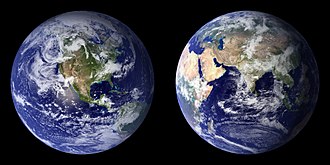
Back أصل الماء على الأرض Arabic পৃথিবীর পানির উৎস Bengali/Bangla Herkunft des irdischen Wassers German Origen del agua en la Tierra Spanish خاستگاه آب بر زمین FA Maapallon veden alkuperä Finnish Origine de l'eau sur la Terre French Orixe da auga na Terra GL Asal-usul air di Bumi ID 물의 기원 Korean

The origin of water on Earth is the subject of a body of research in the fields of planetary science, astronomy, and astrobiology. Earth is unique among the rocky planets in the Solar System in having oceans of liquid water on its surface.[2] Liquid water, which is necessary for all known forms of life, continues to exist on the surface of Earth because the planet is at a far enough distance (known as the habitable zone) from the Sun that it does not lose its water, but not so far that low temperatures cause all water on the planet to freeze.
It was long thought that Earth's water did not originate from the planet's region of the protoplanetary disk. Instead, it was hypothesized water and other volatiles must have been delivered to Earth from the outer Solar System later in its history. Recent research, however, indicates that hydrogen inside the Earth played a role in the formation of the ocean.[3] The two ideas are not mutually exclusive, as there is also evidence that water was delivered to Earth by impacts from icy planetesimals similar in composition to asteroids in the outer edges of the asteroid belt.[4]
- ^ "The World Factbook". www.cia.gov. Retrieved 2016-03-17.
- ^ US Department of Commerce, National Oceanic and Atmospheric Administration. "Are there oceans on other planets?". oceanservice.noaa.gov. Retrieved 2020-07-16.
- ^ Taylor Redd, Nola (April 1, 2019). "Where did Earths water come from". Astronomy.com. Retrieved 2020-07-16.
- ^ Cite error: The named reference
:0was invoked but never defined (see the help page).